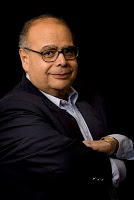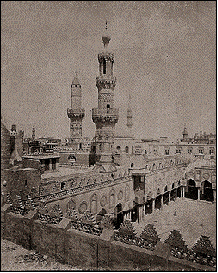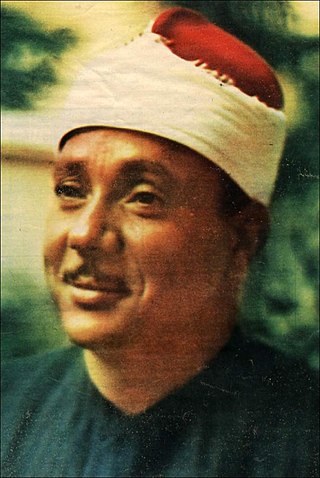Islamism is a religio-political ideology. The advocates of Islamism, also known as "al-Islamiyyun", are dedicated to realizing their ideological interpretation of Islam within the context of the state or society. The majority of them are affiliated with Islamic institutions or social mobilization movements, often designated as "al-harakat al-Islamiyyah." Islamists emphasize the implementation of sharia, pan-Islamic political unity, the creation of Islamic states,, and rejection of non-Muslim influences—particularly Western or universal economic, military, political, social, or cultural.
Hafiz, literally meaning "protector", depending on the context, is a term used by Muslims for someone who has completely memorized the Quran. Hafiza is the female equivalent.

The Salafi movement or Salafism is a revival movement within Sunni Islam, which was formed as a socio-religious movement during the late 19th century and has remained influential in the Islamic World for over a century. The name "Salafiyya" refers to advocacy of a return to the traditions of the "pious predecessors", the first three generations of Muslims, who are believed to exemplify the pure form of Islam. In practice, Salafis maintain that Muslims ought to rely on the Qur'an, the Sunnah and the Ijma (consensus) of the salaf, giving these writings precedence over later religious interpretations. The Salafi movement aimed to achieve a renewal of Muslim life and had a major influence on many Muslim thinkers and movements across the Islamic world.
Qutbism is an exonym that refers to the beliefs and ideology of Sayyid Qutb, a leading Islamist revolutionary of the Muslim Brotherhood who was executed by the Egyptian government in 1966. Influenced by the doctrines of earlier Islamists like Hasan al-Banna and Maududi, Qutbism advocates armed Jihad to establish Islamic government, in addition to promoting offensive Jihad.
Nuh Ha Mim Keller is an American Islamic scholar, teacher and author who lives in Amman. He is a translator of a number of Islamic books.

Nasr Hamid Abu Zayd was an Egyptian Quranic thinker, author, academic and one of the leading liberal theologians in Islam. He is famous for his project of a humanistic Quranic hermeneutics, which "challenged mainstream views" on the Quran, sparking "controversy and debate." While not denying that the Quran was of divine origin, Zayd argued that it was a "cultural product" that had to be read in the context of the language and culture of seventh century Arabs, and could be interpreted in more than one way. He also criticized the use of religion to exert political power. In 1995 an Egyptian Sharia court declared him an apostate, this led to threats of death and his fleeing Egypt several weeks later. He later quietly returned to Egypt where he died.

Islam is the dominant religion in Egypt, with approximately 89% of Egyptians being officially registered as Muslims. However, a study at the University of Kent, citing a 2018 survey by Arab Barometer, stated that around 11% of Egyptians identified themselves as not religious. The majority of Egyptian Muslims are adherents of Sunni Islam, while a small minority adhere to Shia Islam. Since 1980, Islam has served as Egypt's state religion. Due to the lack of a religious census, owing to the alleged undercounting of non-Muslim minorities in Egyptian censuses, the actual percentage of Muslims is unknown; the percentage of Egyptian Christians, who are the second-largest religious group in the country, is estimated to be between 6% and 11% of the population.
Hafiz or Hafez may refer to:

‘Abdul-Basit ‘Abdus-Samad, or Abdel Basit Abdel Samad, or Abdul Basit Muhammad Abdus Samad was an Egyptian Quran reciter and Hafiz and is regarded as one of the best Quran reciters to ever live. He had won three world Qira'at competitions in the early 1970s. ‘Abdus-Samad was one of the first huffaz to make commercial recordings of his recitations and the first president of the Reciters' Union in Egypt. At 10, Abdul Basit finished learning the Quran. He also learned 7 styles of Quran recitation by the age of 12 and the 10 styles by 14. The quadrumvirate of Al-Minshawy, Abdul Basit, Mustafa Ismail, and Al-Hussary, who all belong to the "Egyptian Reciting Style", are generally considered the most important and famous Qurra' of modern times to have had an outsized impact on the Islamic world. He came to be called the Golden Throat and the Voice of Heaven due to his melodious style, breath control, and unique emotional and engaging tone. He has a son, Tareq Abd El Basit Abd El Samad, who is also a known sheikh in Egypt; he has done many interviews on his father's life, family and career.

Salafi jihadism, also known as revolutionary Salafism or jihadist Salafism, is a religious-political Sunni Islamist ideology that seeks to establish a global caliphate, characterized by the advocacy of "physical" (military) jihadist attacks on non-Muslim and (takfired) Muslim targets. The Salafist interpretation of sacred Islamic texts is "in their most literal, traditional sense", which adherents claim will bring about the return to "true Islam".

Sheikh Mahmoud Khalil al-Hussary also known as Al-Hussary, was an Egyptian qāriʾ widely acclaimed for his accurate recitation of the Qur'an. Al-Hussary committed the entire Qur'an to memory by age 8 and started reciting at public gatherings by age 12. In 1944, Al-Hussary won Egypt Radio's Qu'ran Recitation competition which had around 200 participants, including veterans like Muhammad Rifat. The quadrumvirate of El Minshawy, Abdul Basit, Mustafa Ismail, and Al-Hussary are generally considered the most important and famous qurrāʾ of modern times to have had an outsized impact on the Islamic world.

Sayyid Ibrahim Husayn Qutb was an Egyptian Islamic scholar, revolutionary, poet, and a leading member of the Egyptian Muslim Brotherhood in the 1950s and 1960s. In 1966, he was convicted of plotting the assassination of Egyptian President Gamal Abdel Nasser and was executed by hanging. He is considered as "the Father of Salafi jihadism", the religio-political doctrine that underpins the ideological roots of global jihadist organisations such as al-Qaeda and ISIL.

Ahmed Mohamed Ahmed El-Tayeb is an Egyptian Islamic scholar and the current Grand Imam of al-Azhar, Al-Azhar Al Sharif and former president of al-Azhar University. He was appointed by the Egyptian President, Hosni Mubarak, following the death of Mohamed Sayed Tantawy in 2010. He is from Kurna, Luxor Governorate in Upper Egypt, and he belongs to a Sunni Muslim family.

In Egypt, the Muslim Brotherhood is a Sunni Islamist religious, political, and social movement, with adherents estimated to number between 2 and 2.5 million. Founded by Hassan al-Banna in 1928, the group spread to other Muslim countries but has its largest organization in Egypt, despite government crackdowns in 1948, 1954, 1965 and 2013, after plots, or alleged plots, of assassination and overthrow were uncovered.
The al‑Nour Party, or "Party of The Light", was one of the political parties created in Egypt after the 2011 Egyptian Revolution. It has an ultra-conservative, Islamist ideology, which believes in implementing strict Sharia law. It has been described as the political arm of the Salafi Call Society, and "by far the most prominent" of the several new Salafi parties in Egypt, which it has surpassed by virtue of its "long organizational and administrative experience" and "charismatic leaders". Its political aim is to establish a theocratic state on the lines of Wahhabism like in Saudi Arabia. Saudi Arabia was found to be the main financer of the party according to the public German television news service ARD.

El-Nas is an Egyptian television station founded in January 2006 and broadcast from Cairo until the 2013 Egyptian coup d'état.
Madkhalism is a strain of quietist thought within the larger Salafi movement characterised by monarchism and loyalty to governments in the Arab world, based on the writings of Sheikh Rabee al-Madkhali.

Since the classical era, two major scholarly factions have been influential within Islamic societies: Sufism-Ash'arism-Maturidi and Salafism-Atharism. The dispute between these two schools of thought dominated the Sunni world, splitting their influence across religious communities and cultures, with each school competing for scholarly authority via official and unofficial religious institutions. The relationship between Salafism and Sufism – two movements of Islam with different interpretations of Islam – is historically diverse and reflects some of the changes and conflicts in the Muslim world today.
Starting in the mid-1970s and 1980s, Salafism and Wahhabism — along with other Sunni interpretations of Islam favored by the Kingdom of Saudi Arabia and other Gulf monarchies — achieved a "preeminent position of strength in the global expression of Islam."
Sheikh Alhaji Mohamed Sanusi Tejan was a revered Sierra Leonean Oku Sunni Muslim preacher, Islamic scholar, Islamic theologist, architect, and the former Chief Imam of the Jamiatul Atiq Masjid.








